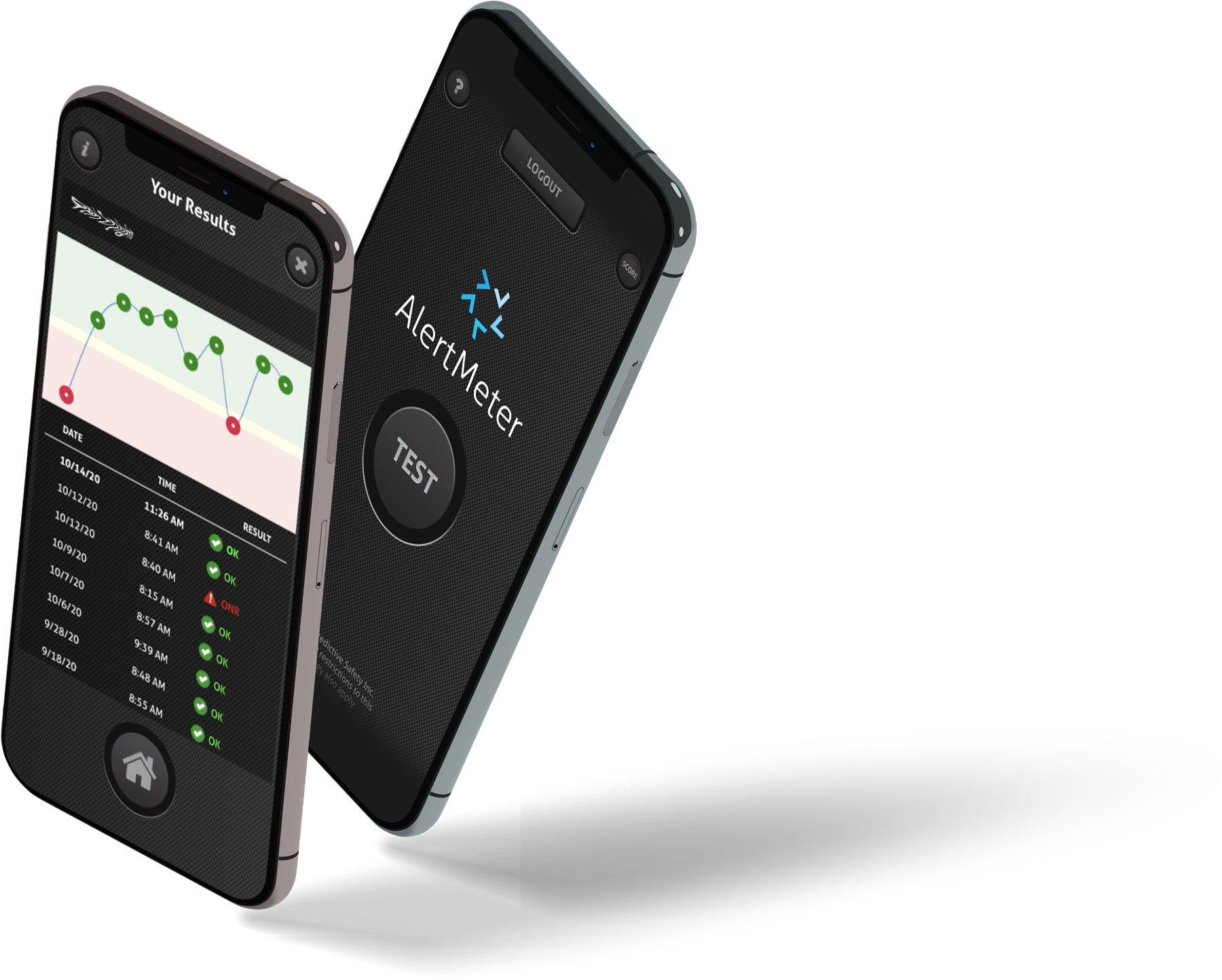The AlertMeter®
In Safety, your job is to try to anticipate WHERE the next injury/incident could happen
and then put better safeguards in that place. The AlertMeter® allows you to anticipate
WHO the next at risk person could be and put safeguards in place for that specific person at that moment.
AlertMeter®
Alertness Tracking Software for the Twenty-First Century Workplace How it WorksBook A DemoQuick & Accurate
Accurately Track Any Worker, Anytime, in Just 60 Seconds
Accessible & Easy to Use
Non-Lingual, Game-Like Interface From Any SmartPhone or Device
Objective & Non-Discriminatory
Tracks the Potential for Compromised Alertness, Due to Any Cause, Against a Worker’s Personal Baseline
Bottom Line: The AlertMeter® Makes A Quantifiable Difference
With Over 90 Million Worker Hours… The ROI Is Clear
%
Avg. Worker's Comp Claim Reduction
%
Avg. TRIR Reduction
%
Avg. Reduction Of Cost Of Incidents

Just One Worker Not Sufficiently Alert and Fit-for-Work Puts Your Company At Risk
A worker who lacks sufficient alertness to perform their duties is a danger to themselves, their co-workers, and your company.

AlertMeter® | Track Worker Alertness
- Developed in response to the $9 Billion Exxon Valdez accident
- Based on NASA’s Psychomotor Vigilance Test
- Initial R&D funding provided by NIOSH
- Over 90 million worker-hours tracked
- 13 Patents
- Shown to be successful in the highest risk, SIF-categorized industries including mining and oil & gas
Make Your Substance Policies More Effective & Less Confrontational with AlertMeter®
Conventional Drug Testing
- X Inconsistent Application of Policy
- X Hit-Or-Miss – who gets tested today may not be who should get tested
- X Discriminatory – can rely on subjective observation from supervisors not sufficiently qualified
- X Cause-specific
- X Invasive, time-consuming and expensive
- X Has well-established protocols for cheating
- X Combative – puts the worker in an adversarial relationship with management; risks loss of valuable team members
- X Not scalable
The AlertMeter® App
- + Consistent Application of Policy
- + Everyone gets tested at the start of every shift or workday
- + Non-discriminatory – relies on objective data
- + Cause-agnostic
- + Non-invasive, quick and cost-effective
- + Can’t be cheated – results are compared to a personal baseline
- + Collaborative – empowers workers to optimize their performance capacity and helps create a “culture of safety”
- + Scalable
When combined with current drug testing policies, AlertMeter can help eliminate subjectivity in determining who should be tested, ensuring a consistent application of policy and more precise identification of the small percentage of workers who pose the greatest risk. *The AlertMeter is not an approved replacement for drug testing when drug testing is mandated.
Review case studies from industries like yours.

Transportation & Logistics
Performance data collected over six months of AlertMeter® use demonstrated its effectiveness in ensuring fitness-for-duty among truck drivers.

Manufacturing
AlertMeter® provided company owners a way to test for fitness-for-work while maintaining fairness for employees.

Construction
At a major company in a high-risk industry, three work sites were measured and compared. One of the sites used AlertMeter®.
Vforge, Inc. management shares how AlertMeter® has reduced incidents and Workers Comp costs and helped to create a “culture of safety.”

Discover How Predictive Safety Can Help You Create a Safer, More Productive Workforce...
Even during a historically tight labor market and high demand.
Frequently Asked Questions
How frequently does an AlertMeter test suggest a worker may not be as alert as they should be?
Fortunately, the majority of employees arrive at work alert and ready for work, and an employee's daily AlertMeter "in range" result can provide an affirmation for that good practice.
Data from over 75 million worker-hours indicates that on average only 1.5% of all AlertMeter tests will test out of range. Accurately identifying this small percentage who may lack sufficient alertness, due to any cause, enables supervisors to open productive conversations and apply your standard company policies.
What is the protocol when an employee's test shows them to be potentially not as alert as they should be?
Because AlertMeter only identifies when an employee's test results fall outside the employee's personally derived tolerated performance margin, and does not indicate the cause for the deviation, your next step is based upon your company policies and Human Resource protocols.
Are baseline scores static or dynamic?
Are baselines separated according to industry or industry segment?
No, all scores are specific to individual users and are independent of industries or sectors, other employees in the same company, age, and/or gender.
